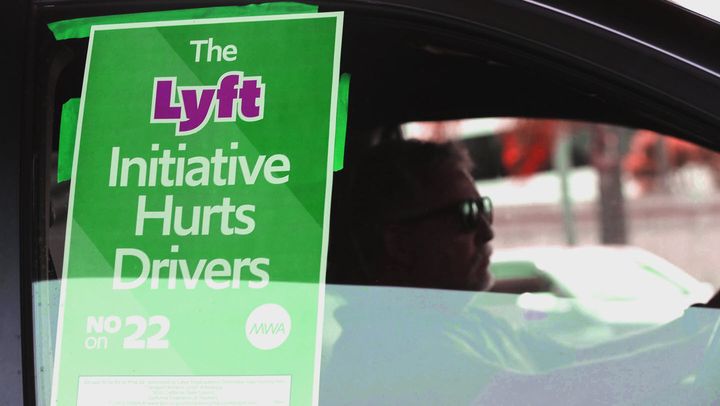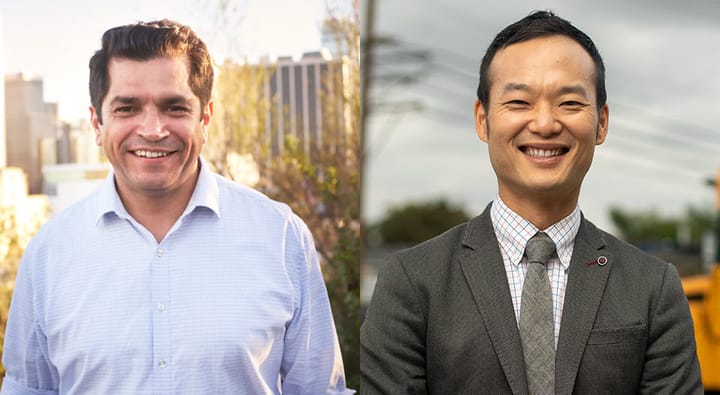The American Prospect is a nonprofit, independent magazine covering public policy and politics. Sludge is re-publishing this article.
As usual in presidential years, the election night excitement in true-blue California will come not at the top of the ballot, where Democrats are all but assured victory, but from the state’s exhausting experiment with direct democracy. And nestled amongst this year’s 12 ballot measures on everything from taxes to voting rights to criminal justice to data privacy to health care sits perhaps the most consequential labor decision in decades.
Proposition 22 is simple. It carves out an exemption for app-based rideshare and delivery workers, allowing companies like Uber, Lyft, and DoorDash to continue misclassifying employees as independent contractors. This exempts those startups from paying minimum wage, carving a loophole in last year’s AB-5 law, which made many independent contractors and freelancers employees and conferred on them a handful of rights and protections. For those workers, it would mean no eligibility for state unemployment insurance, extremely curtailed worker protections, no overtime, no sick leave, no workplace discrimination protection, and no right to collectively bargain. In essence, it would formalize and enshrine an entirely new category of substandard employment for a class of workers that is made up overwhelmingly of people of color and immigrants. And it would do so permanently: The proposition states that any amendment to the regime would require an unprecedented seven-eighths majority vote in the state legislature.
In place of state labor laws, Prop 22 “guarantees” certain benefits, including completely undefined “assistance” with health care premiums and disability coverage for those injured on the job. To understand how inessential these benefits are, look only to the “minimum earnings” promise. Drivers are guaranteed an hourly wage at least 120 percent of the local minimum. But that only kicks in during time spent driving, while waiting for or getting to a ride or a delivery, which can be as much as 37 percent of the time spent on the job, remains uncompensated. When you factor in time on the clock that remains unpaid, the “guarantee” would yield a subminimum wage for most drivers. A UC Berkeley Labor Center study estimates the average wage under Prop 22 as low as $5.64 an hour, a drastic pay cut from the $13 minimum wage they would be guaranteed as employees.
Prop 22 has quickly become one of the most contentious political battles in the state. It’s also the most expensive ballot proposition, not just in California’s history, but in the entire history of the United States. Rideshare and delivery startups—Uber, Lyft, Postmates, Instacart, DoorDash—have contributed over $184 million so far to ensuring passage. No on 22, the campaign to uphold current employment law, has just over $10 million.
Part of the reason this has become such a pricey priority for Silicon Valley and its venture capital backers is the stakes of its passage. The business model of Uber and Lyft and its compatriots is predicated on the misclassification of their workforce as private contractors and the cheap, substandard labor protections that brings. For example, refusal to pay into the state’s unemployment insurance fund has saved Uber and Lyft a combined $413 million since 2014. Even with that advantage, those companies still don’t turn a profit, but forcing them to conform to labor standards would make their push for profitability potentially impossible. So the survivability as a business for these firms is tied directly to exploiting their workers.
If Prop 22 passes, it would reach far beyond a couple hundred thousand drivers in California working in food delivery and ride-hailing. It would send shock waves all over the country, becoming the basis for a formalized tier of substandard labor that would certainly be exported, across numerous industries and millions of workers, and internationally as well.
It would also set a troubling precedent for venture capital money in politics, as there would be obvious proof of their ability to buy their way out of regulation via ballot measure, and override the will of multiple chambers of a democratically elected legislature. “If it becomes clear you can buy any law with $180 million, then a lot more industries will head down this route, turning good jobs to bad jobs, full-time teaching to all substitutes, unionized nursing to precarious contract nursing gigs,” says Veena Dubal, an associate professor of law at the University of California, Hastings. “The way they’ve worded it is such that it will spread beyond the delivery industry, literally formalizing all the exploitation that happens in the informal economy … it’s the biggest threat since the 1930s that America has seen to the social safety net, minimum wage, and access to secure pay.”
With all that money, the Yes on 22 campaign is pulling out all the stops, hiring big-time PR firms like MB Public Affairs, which made their reputation working for Big Tobacco and going after critics, sometimes viciously. Meanwhile, Uber and Lyft have paid to place Yes on 22 messages within the interfaces of their own apps. A screen that pops up when Uber drivers log on compels them to affirmatively commit to voting Yes on 22 before granting rides or deliveries.
The business model of Uber and Lyft is predicated on the misclassification of their workforce as private contractors and the cheap, substandard labor protections that brings.
The campaign has produced a massive multimedia ad blitz, even attempting to recast Prop 22 as a racial-justice issue. It’s a cynical maneuver, recasting a law that would wipe out the wage floor of an overwhelmingly minority and immigrant workforce as a racial-justice priority. Using the language of activists and claiming the endorsements of minority groups (even if they don’t have them), it has tried to convince voters that passage would be a triumph for communities of color. In certain instances, the Yes on 22 camp has relied on outright misinformation, suggesting that it has the support of Black Lives Matter groups, only for those groups to clarify that is not in fact the case. Currently, the Yes on 22 website indicates that the Rev. Al Sharpton’s National Action Network’s Sacramento chapter supports the initiative, though statements from the group’s leadership indicate otherwise.
But leadership at institutional Black and Latino groups in California, including NAN’s statewide chapter, the California NAACP, and the Si Se Puede Foundation, have formally supported Yes on 22. Lyft has offered free rides to members of the NAACP and NAN as recently as April, with the latter group having received money from Uber and Lyft in the past.
NAACP California President Alice Huffman’s support of Yes on 22 has been particularly prolific, and flagrant. Huffman has appeared in ads urging voters to support Prop 22, and featured in an email Uber sent to its customers titled “Why communities of color support Prop 22.” She’s written op-eds in Black newspapers advocating for 22 on racial-justice grounds, and appears repeatedly in the California voter handbook and an election pamphlet called “Minority News” stumping for the measure. Left out of her and the California NAACP’s enthusiastic and repeated endorsement of the measure is the fact that Huffman has been paid $85,000 so far by the Yes on Prop 22 campaign as a public-affairs consultant, part of an incredible $1.2 million haul from ballot measure campaigns this year for her firm, AC Public Affairs.
Contrary to Huffman and her wallet, Prop 22 would create a lower set of labor protections for a class of workers that is majority-minority. “Why would we want gigs for people of color that pay them less than whites?” asks Dubal. “Differential wage codes and classification for people of color and immigrants is exactly what Southern Democrats argued for during the New Deal, when they wanted to keep agricultural laborers suppressed and argued that they shouldn’t get access to minimum wage.”
Where, one might wonder, is organized labor on all of this? The paltry $10 million that No on 22 has been able to raise has come largely from unions. But organized labor has been hit extremely hard by the pandemic, with its concomitant wave of layoffs, which has simultaneously given a boost to rideshare and particularly delivery companies, which have seen usage increase with people unable to comfortably shop and go to restaurants.
Prop 22 would create a lower set of labor protections for a class of workers that is majority-minority.
National Democrats, including Joe Biden, Kamala Harris, and Elizabeth Warren, have come out in opposition to Prop 22, but they haven’t been especially vocal on the issue. This is somewhat understandable since the California ballot is of a lower profile than the presidential election. But Obama-era Democrats have assumed high-ranking roles at a number of gig companies. Tony West, who served for five and a half years in the Obama Department of Justice and was once its third-ranking member, and is brother-in-law to Kamala Harris, is the chief legal officer at Uber. Former senior adviser to Obama Valerie Jarrett is on the board at Lyft.
That’s restaging an intraparty crisis that played out just over a year ago, when AB-5, the bill that conferred employee status on gig workers and other independent contractors, was being considered in the state legislature. One would think that its passage would have settled the matter, but rideshare companies first responded by threatening to leave the state entirely in a capital strike, a move that is illegal in most countries. Meanwhile, these companies pledged record-setting money to circumvent the law with a ballot measure, which means that everything is now riding on the vote count come November.
Somehow, despite the massive financial imbalance, polling still shows that the race is relatively tight, though No on 22 trails. But if Prop 22 passes, it will have a more profound impact on labor than the election of Joe Biden, who has made expanding union density one of his platform priorities, or even a Democratic sweep in the House, Senate, and presidency. It could even have a more profound downstream impact on organized labor than an Amy Coney Barrett appointment to the Supreme Court. As deep-blue California goes, so goes the country.
Read more from Sludge:
Bank Lobby’s Pro-Tillis Ad Follows Legislative Favors from the Senator
Trump Admin Did Little to Prevent PPP Fraud, New Report From House Dems Concludes
In Heavily Gerrymandered Wisconsin, a Bipartisan Grassroots Movement Fights for Fair Maps


